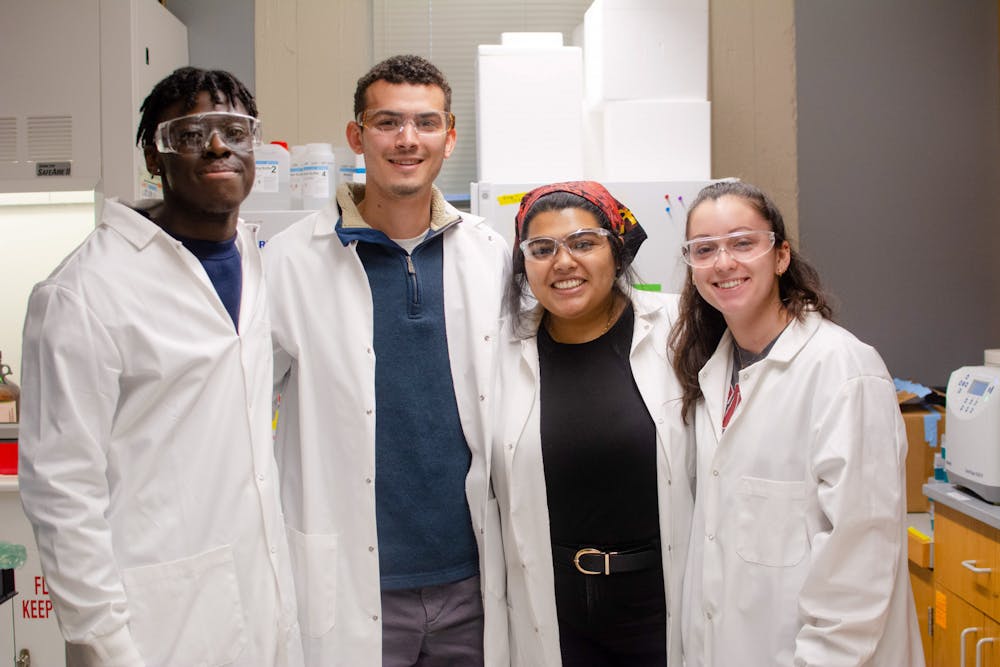A team of biomedical engineers in the Tripathi Lab for Microfluidic Diagnostics & Biomedical Engineering at the University published a paper last month detailing the results of a two-year study that developed a more efficient technique to detect the level of antidepressants in biological samples, according to a Feb. 10 news release — and potentially the detection of drugs in any biological sample.
Drug detection in biological samples usually requires a procedure known as liquid chromatography tandem mass spectrometry, abbreviated to LC-MS/MS, a relatively complicated process according to the release.
The project of simplifying that process first began in 2021, when the lab had the job of evaluating a European test kit that uses LC-MS/MS for drug detection.
This evaluation led Ramisa Fariha GS, lead author of the study and a third-year PhD student in the lab, and her team to design their own test kit after identifying commonly-detected drugs and refining the LC-MS/MS techniques.
“As we started investigating, the (European) kit failed to produce the results it claimed and as we tried to automate it on the robotic liquid handler, we realized how automation-unfriendly it was,” Fariha wrote in an email to The Herald. “As a result, we took matters into our own hands and developed our own prototype kit from scratch.”
To prepare liquids for the drug detection process, the team refined the process of LC-MS/MS so that they could break it down into multiple steps programmable into a machine. The method was made simple enough so that other clinics can replicate their process, according to the study.
Benefits of the study
LC-MS/MS often presents challenges surrounding the availability of the analytes — the drug measured by the test — within the sample, the length of analysis, the process’s complexity and other factors.
To see if they could combat these flaws, Fariha’s team worked to accurately measure and identify eight antidepressants most commonly prescribed to women from small biological samples — 20 microliters, or the amount of blood taken from a prick.
She explained that liquid chromatography causes physical separation of the analytes in the fluid, whereas mass spectrometry detects these analytes based on their mass-to-charge values, as they flow through the detectors as ions.
The mass spectrometer then took in the patients’ samples and broke them down into tiny pieces that identified drugs the research team was looking for: an accurate, easily automated process that requires a minimal sample.
LC-MS/MS can be used for quantifying steroids, drugs, metabolites, proteins and even small molecules. Fariha described it as a “versatile instrument when used right.”
The improved technique has the potential to be broadly translated to clinical settings and monitor how prescribed medications impact patients with depression, she added, especially given the need to monitor postpartum depression.
“There are more women now on prescribed antidepressants than there were a decade ago,” wrote Fariha, whose team works on developing clinically relevant diagnostic procedures for female reproductive health disorders.
“The main goal of this study was to work with a sample volume so small that mothers of newborns would not have to travel to clinical facilities to get their blood drawn,” she wrote.
Student assistants discuss project
Emma Rothkopf ’23, an undergraduate research assistant on Fariha’s team, wrote in an email to The Herald that her favorite aspect of the study was creating the prototype kit.
Rothkopf helped perform the optimization experiments, operating the LC-MS/MS and completing data analysis. She noted that the ultimate goal of the study was to improve the general treatment of mental illnesses.
“There is not a lot of quantitative data for the individual patient to understand how much of the antidepressant is actually present in the body,” Rothkopf wrote, stating that the new technique helps address the void in the field.
“At present, the efficacy of an antidepressant drug is measured qualitatively,” Fariha wrote. “Therefore, there is a need for a quantitative solution for it in the healthcare market.”
Adam Spooner ’23, another undergraduate research assistant on Fariha’s team, wrote in an email to The Herald that he particularly enjoyed the first few automated sample preparation runs on the JANUS work deck, the machine that took in the team’s broken-down procedure steps.
“Automating the entire process for technicians improves the efficiency and accuracy of the test, allowing for the testing of more samples in a shorter amount of time with more accurate results,” Spooner wrote.
“Allowing physicians to simply and effectively monitor patients on antidepressants improves the outcomes for patients,” he added, emphasizing the significance of using the new LC-MS/MS technique to ensure patients receive the correct dosages of the correct medications.
Rothkopf wrote that her experience in the study was eye-opening because she was able to actively apply the concepts she learned in her engineering classes to her experiments while solving pressing medical problems.
Spooner added that the presence of this “amazing team of researchers” enhanced the pride that he felt while working on this project, making it a “fun and rewarding experience each time I stepped foot in the lab.”
Robayet Hossain is a Science and Research staff writer focusing on up-and-coming research and departmental updates. He is a first-generation sophomore from Bangladesh and graduated in New Orleans. He loves listening to a variety of music genres and reading horror stories just to have problems falling asleep.





